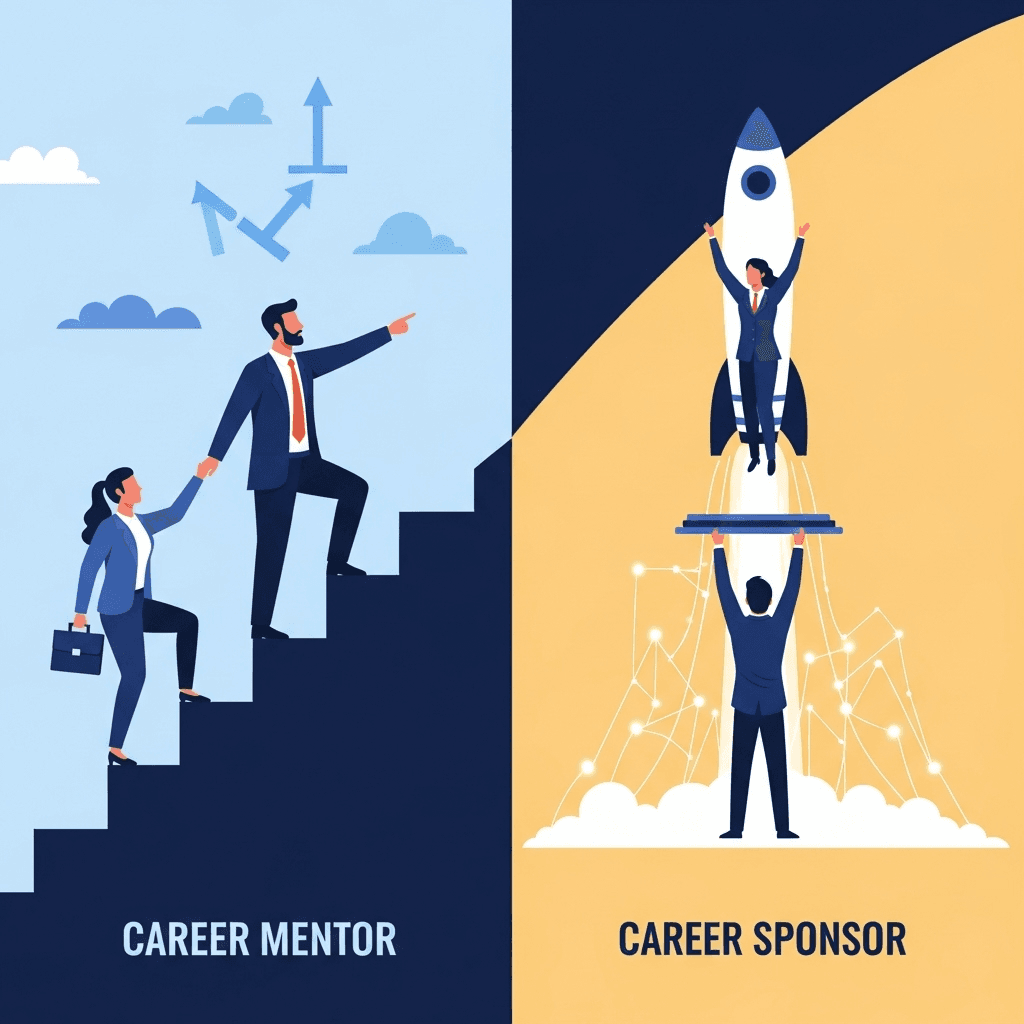Mentor vs. Sponsor: Why You Need Both for Career Success and How to Find Them

In the complex world of career advancement, it’s easy to believe that hard work alone is the key to climbing the ladder. While performance is undeniably the foundation, it's often not enough. To truly accelerate your growth, you need a strong support system. Two of the most powerful allies you can have are a mentor and a sponsor. But they are not the same thing.
Many professionals use the terms interchangeably, but this is a critical mistake. Understanding the distinct roles a mentor and a sponsor play is the first step toward strategically building a network that doesn't just support you, but actively propels you forward. Let’s break down the difference, why you need both, and how you can cultivate these game-changing relationships.
The Mentor: Your Personal Career Guide
What is a Mentor?
A mentor is a trusted counselor or guide who provides advice, shares knowledge, and helps you navigate your professional journey. They talk with you. Think of a mentor as your personal sounding board—someone you can go to with questions, challenges, and ideas in a safe, confidential space. Their primary role is to help you develop your skills, broaden your perspective, and make informed decisions.
The relationship is focused on your growth. They offer the wisdom of their experience to help you become a better professional.
Why You Need a Mentor
A Safe Sounding Board: A mentor provides a space to ask the "stupid questions" and explore ideas without fear of judgment.
Skill Development: They can help you identify blind spots in your skill set and guide you toward resources or experiences to fill those gaps.
Expanded Perspective: Mentors often have a wealth of experience in your industry and can offer insights you wouldn't get on your own.
Objective Advice: They can provide unbiased guidance on everything from handling a difficult colleague to negotiating a job offer.
The Sponsor: Your Advocate in the Room
What is a Sponsor?
A sponsor is a senior-level leader who uses their influence and political capital to advocate for your advancement. They talk about you—specifically, in the high-stakes rooms where decisions about promotions, key projects, and new opportunities are made. A sponsor doesn't just give you advice; they take action on your behalf.
The relationship is focused on your advancement. A sponsor puts their reputation on the line to champion you because they believe in your potential and see your performance as a valuable asset to the organization.
Why You Need a Sponsor
Visibility: Sponsors ensure your achievements are seen by the right people, giving you credibility at senior levels.
Advocacy: They will actively campaign for you to get promotions, raises, and spots on high-visibility, career-making projects.
Connections: A sponsor can open doors by connecting you to their influential network.
Air Cover: They can defend you from unfair criticism and help you navigate organizational politics.
How to Find and Cultivate These Relationships
Finding a mentor and earning a sponsor require two very different strategies. One is about asking, the other is about earning.
Cultivating a Mentor
Identify Potential Mentors: Look for people you admire, both inside and outside your company. They could be a senior colleague, a former boss, or someone in a role you aspire to.
Do Your Homework: Understand their career path and what you specifically want to learn from them. A generic request is easy to ignore.
Start Small: Instead of bluntly asking, "Will you be my mentor?", reach out with a specific, low-commitment request. Try: "I was so impressed by your work on the X project. Would you have 15 minutes for a virtual coffee so I could ask you a few questions about your experience?"
Nurture the Relationship: If the initial conversation goes well, follow up. Keep them updated on your progress, thank them for their advice, and find ways to provide value back to them, even if it's just sharing an interesting article. Let the mentorship develop organically.
Earning a Sponsor
You don't ask someone to be your sponsor; you earn their sponsorship through your actions. Sponsorship is the result of performance and visibility.
Deliver Exceptional Performance: This is non-negotiable. You must be a top performer in your role. Sponsors back winners because it reflects well on them.
Increase Your Visibility: Great work that no one sees is invisible. Make sure senior leaders know who you are and what you’re achieving. Volunteer for challenging projects, present your team's work, contribute thoughtful ideas in meetings, and network internally.
Align with a Leader's Goals: Identify influential leaders in your organization. Understand their priorities and find ways your work can help them achieve their goals. When you make your boss and other leaders look good, they are more likely to champion you.
Make Your Ambitions Known: A potential sponsor can't advocate for you if they don't know what you want. In performance reviews or informal check-ins with your manager or a trusted senior leader, clearly and professionally articulate your career aspirations.
Getting Noticed: The First Step to Finding Your Champions
Before you can impress a potential sponsor with your performance or connect with a mentor, you need to be in the right role. But in today's job market, even getting an interview for that role feels like an impossible task. Highly qualified professionals are constantly filtered out by automated, biased Applicant Tracking Systems (ATS) that reduce entire careers to a 6-second keyword scan. How can you find your champions if you can't even get past the gatekeepers?
You have to fight fire with fire. This is where we come in.
Introducing Best CV "52": The Resistance Against the 6-Second Scan
At www.bestcv52.com, we are leading the charge against a broken hiring system. Born from the experience of crafting 52 unique CVs for 52 different roles, we exist to give highly-qualified professionals a fair shot in a rigged game. We don't just "tweak" your CV; we arm you with a comprehensive, AI-powered arsenal for every single job application.
Your Personalized Career Warfare Kit
When you provide your CV and a job description, our superior AI performs a deep analysis to generate a complete application package designed to beat the bots and impress the humans:
A Perfectly Tailored CV & Cover Letter: Surgically rewritten to align with the job’s requirements, the company’s culture, and the known biases of their ATS.
Strategic Communication Templates: A full suite of emails (application, follow-up, thank-you) and LinkedIn messages designed to get replies from hiring managers.
A Corporate Dossier & Personal SWOT Analysis: We dissect the company and provide a personal SWOT analysis for the role, so you can speak their language and articulate your unique value.
The Interview Arsenal: A customized prep guide with tailored questions and strategic talking points to transform your experience into an undeniable match for the position.
In a world where architects and surgeons get more than 6 seconds to review critical information, you shouldn't accept that for your career. We ethically and strategically highlight the truth of your experience to get you the interview you deserve.
Stop screaming into the void of the "Apply Now" button. Join the resistance today.
Quick Q&A: Mentors vs. Sponsors
What's the main difference between a mentor and a sponsor?
A mentor advises you privately, helping you develop your skills and navigate your career path (they talk with you). A sponsor advocates for you publicly, using their influence to get you promoted and onto key projects (they talk about you).
Can one person be both a mentor and a sponsor?
It's possible, but often they are separate roles. The confidential nature of mentorship can sometimes conflict with the public advocacy of sponsorship. It's generally more effective to cultivate both types of relationships separately.
How do I ask someone to be my mentor?
Avoid the formal, high-pressure question. Instead, start by asking for advice on a specific topic. Let the relationship develop organically over time based on mutual respect and value.
How do I get a sponsor?
You don't ask, you earn it. Sponsorship is a direct result of three things: exceptional performance, high visibility within your organization, and making your career ambitions known to senior leadership.
Which is more important, a mentor or a sponsor?
You need both. They serve different but equally crucial functions. A mentor helps you prepare for the journey, and a sponsor helps you get to the destination. Neglecting either one can stall your career growth.
Building your career is a team sport. By understanding the critical roles of mentors and sponsors, you can move beyond simply working hard and start working smart. Go out and build your personal board of directors—your future self will thank you for it.


